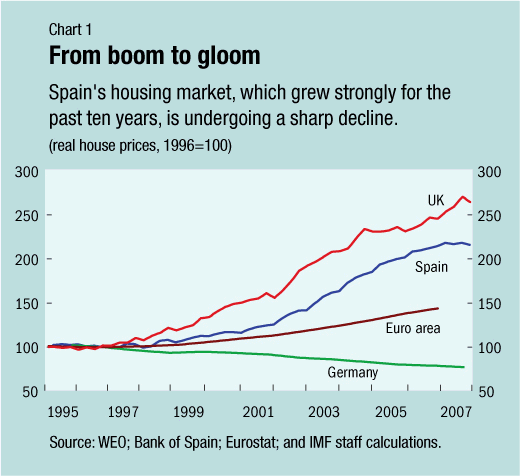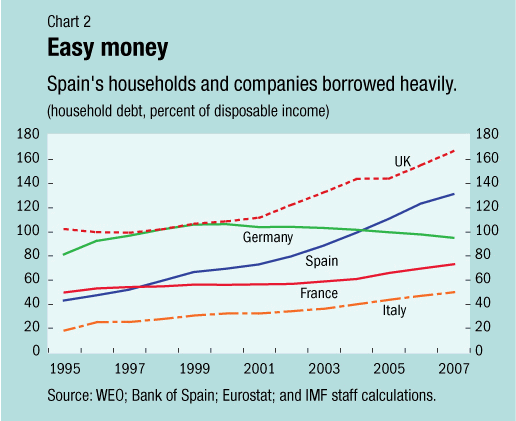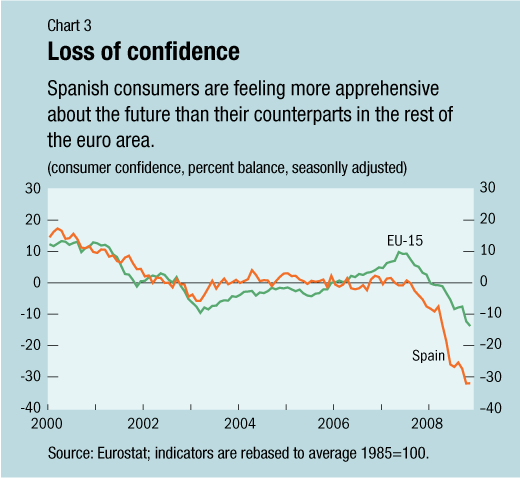
Typical street scene in Santa Ana, El Salvador. (Photo: iStock)
IMF Survey: Hard Landing for Spain
April 24, 2009
- Economy to begin recovery in 2010 after 3 percent decline in 2009
- Housing correction will take time
- Banks holding up well but facing difficult market conditions
The global economic crisis has hit Spain hard. Domestic demand is declining and job losses are mounting, driven by the downturn in construction.

New apartments in Sesena, Spain, where economic growth relied on credit-fueled domestic demand, housing boom (photo: Pedro Armestre/AFP)
ECONOMIC HEALTH CHECK
Confidence has declined because of lower household incomes, and families and businesses are struggling to pay off debt. As a result, the IMF, in its regular assessment of Spain’s economy, projects a growth decline of 3 percent of GDP in 2009.
Hard landing
All of Europe is suffering the consequences of the crisis, but Spain’s economy has proved especially vulnerable to the global credit crunch because economic growth relied heavily on credit-fueled domestic demand and a housing boom (see Charts 1 and 2). Spain’s business sector also invested heavily, but productivity gains remained moderate. This didn’t prevent wages from rising, often exceeding average wage gains in the rest of the euro area.
Besides wage increases, inflation also has been higher on average than in the other euro area countries. Because Spain uses the euro, the result has been a decline in the country’s competitiveness and large current account deficit. In mid-2007, these developments came to a head as credit availability dried up, and Spain’s decade-long expansion ended abruptly. Confidence declined sharply with Spanish consumers now among the most pessimistic in the euro area (see Chart 3).
Housing bust
During the good years, Spain’s housing boom was a driving force behind economic growth. Now, housing starts have fallen to about one-fifth of their peak level. As houses are finished, construction will decline further, and one million construction jobs may be lost as a result.
The government has taken a number of steps to help the housing market. It is trying to develop the country’s underdeveloped rental market, which amounts only to some 12 percent of all housing units. It is also offering credit lines for developers to convert unsold houses to rentals, is introducing tax exemptions for rental income, and is clarifying rules for resolving rental disputes.

The government is also seeking to limit foreclosures, for instance by extending the life of mortgages for home owners in financial difficulties, and by helping newly unemployed families to defer partially their monthly mortgage payments—at least for a while.
All these steps are helpful, but the government should be careful not to expand subsidized housing in a market that is already oversupplied. Inventory needs to come down. Otherwise house prices may decline faster, with negative consequences for existing homeowners, bank mortgages, and government revenue.
Safeguarding the banks
In contrast to the housing sector, Spain’s financial sector has weathered the crisis well so far, thanks to strong and forward-looking prudential regulation. Dynamic loan-loss provisioning saw banks build up significant cushions during the expansion, and rigorous consolidation rules discouraged the development of off-balance sheet vehicles. And because they mainly cater to retail customers, Spain’s banks were not directly affected by U.S. subprime losses.
Now, the key challenge for banks is to weather the overall economic slowdown. A prolonged downturn could postpone a turnaround in the housing market and weaken asset quality for banks in general. Impaired loans are rising rapidly, albeit from a low base.

Some consolidation in the banking sector is also likely. With credit likely to grow much more slowly in future, fewer banks will be needed. Fewer and larger institutions could benefit from economies of scale and from broader regional diversification, but some targeted public assistance may be necessary to facilitate consolidation. The IMF is advising the authorities to keep some fiscal resources in reserve for this contingency. It may also be a good idea to minimize legal hurdles to mergers and acquisitions within and between different regions of the country.
Leveraging fiscal policy
During the past decade, Spain’s fiscal position improved significantly, reaching a surplus of 2.2 percent of GDP in 2007, with public debt nearly cut in half to 36 percent of GDP. But the downturn in housing and weak domestic demand has resulted in a sharp decline in tax revenues. Combined with the cost of a fiscal stimulus package enacted by the government, the IMF estimates that the country is now facing a deficit of about 7½ percent of GDP in 2009.
A fiscal stimulus was the right thing to do, but the government should have linked this more tightly to enacting overdue reforms that could have improved the economy’s growth potential. The measures in the package were mainly aimed at propping up demand through tax breaks and subsidies to employment, and at providing assistance to the unemployed.

This does not reduce the short-term benefit of the fiscal stimulus. But it does diminish its long-term impact because the package will not contribute to higher growth. The IMF is advising the government to combine any further stimulus with overdue reforms, including in labor markets.
For instance, Spain is facing significant costs related to the aging of its population.
Aging-related costs are projected to increase to 8½ percent of GDP by 2050. Without reforms, the IMF’s analysis suggests that escalating costs will result in runaway debt. To encourage public debate on this important and growing problem, the IMF is advising the authorities to publish a public sector balance sheet that reflects existing debt as well as implicit debt due to uncovered social insurance promises.
Searching for a new growth model
Spain cannot afford to wait to improve competitiveness. Residential construction and private consumption will no longer drive growth as they have in the past. In future, Spain will have to rely more on industry and its services sector to generate jobs and growth. To do this, the economy must improve productivity and lower costs.
Ambitious labor and product market reforms are key to tap new sources of growth. Such policies should be implemented simultaneously to avoid destabilizing shifts in income distribution.
Plans for product market reforms, including the translation of the European Services Directive into Spanish law, will require strong implementation. Spain also needs wage moderation and labor reforms.
For instance, wage indexation is inconsistent with membership in a currency union. Reducing labor market segmentation, caused by the separation of workers into those in permanent versus fixed-term contracts, is also necessary to allow well-trained young workers to move into higher-paid, permanent jobs. Finally, opt-out clauses in collective labor agreements should be invoked earlier than is now the case, so that companies have a better chance at surviving the downturn and protecting jobs.
Spain faces a difficult road to recovery. The contrast with the boom years is acute. But if it handles the crisis right, and carries out long-needed reforms, it should be able to regain its place as one of the fastest-growing economies in the euro area.
Comments on this article should be sent to imfsurvey@imf.org


